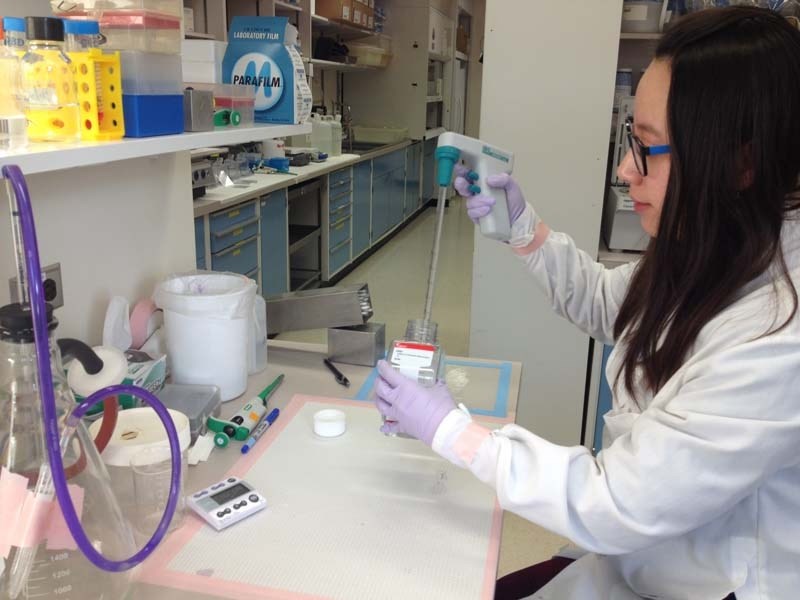Dr. Ing Swie Goping's dream is that someday, she and her team of cancer-therapy researchers will be able to develop diagnostic tools that will help breast cancer patients to live longer.
Goping, an associate professor in the Department of Biochemistry with the University Alberta's Department of Medicine and Dentistry received a three-year $125,000 grant this past September from the Canadian Breast Cancer Foundation to help her with her research. She is adamant that without that funding, which came in part from money raised in annual Run for the Cure events, further research would be limited.
"The research for breast cancer is so encouraging. We are walking towards personalized medicine for breast cancer patients and the breakthroughs that are happening don't happen with other cancers. Those breakthroughs are happening because of world-wide research in the field of breast cancer," Goping said.
Goping's current research focuses on finding a way to make chemotherapy more personalized for each patient. She hopes her research will define which women will have a resistance to some chemotherapy drugs.
"Some patients don't respond well to some chemotherapy treatments and we are trying to understand which of those tumours will not respond," she said.
Cell proteins
Oncologists know that not all cancers react in the same way and not all treatments have the same effect.
Among the most powerful chemo treatments used to treat breast cancer is a drug called Taxane, which is derived from Pacific yew trees.
Taxane affects the cell structure and prevents cancer cells from growing. When Taxane is administered, some patients experience serious side effects, such as nausea, diarrhea, and increased susceptibility to infection. Unfortunately even though the treatment is often hard, some patients develop a resistance to it. Goping believes she is starting to understand why.
"In the lab we are targeting a specific group of proteins within the cells. We could examine 50,000 proteins, but we are looking specifically at the proteins that are important because they give the cell the message that it needs to die," she said.
Goping is testing to see what happens to cancer cells when they are given protein and what happens if the proteins are taken away.
"We look at samples from patients' tumours and test them," Goping said, adding that the discovery of the human genome has helped researchers understand cancer cells better.
"It's astounding how different the cells can be. When you look at the DNA sequence there are thousands of differences and so many things we don't understand yet, but we are learning more about what proteins do and that has led to a deeper understanding," she said.
Ultimately she hopes to be able to test each patients' individual cancer tumours to determine which specific chemotherapy treatments would be most beneficial.
"We're looking for a bio-marker," she said.
Potentially, such knowledge could mean that patients who would not be helped by Taxane, could be given other treatments.
It's also possible the research could lead to the development of other treatments or drugs that would be administered together with Taxane.
CBCF funds
To date the October 6 CIBC Run for the Cure event in Edmonton stands at $1.59 million. The distribution of this year's funds has not been determined as yet, but for the 2012-2015 grant period, the Breast Cancer Foundation distributed $6.8 million to 17 research projects.
At the University of Alberta alone, these grants are going to support 10 researchers working to gain a better understanding of breast cancer, treatments and the emotional well-being of patients.
In January the University of Alberta and the Canadian Breast Cancer Foundation announced that the discovery by Dr. Sambasivarao Damaraju of a genetic marker for breast cancer recurrence, "Could renew hope."
"The discovery of the marker by Dr. Damaraju will help oncologists predict which women were more likely to have cancer return years later," the CBCF announced in a press release.
Dr. Damaraju was not available for interviews for this article, but in the same press release his comments seem to point to a new direction for the treatment of breast cancer patients.
"The current practice is to avoid over-treating the patient, so people with good prognosis breast cancer don't receive very aggressive treatments. Why subject all patients to adverse drug reactions and lower quality of life when only a subset has a predisposition for the disease to occur? But if we know which of the subset is going to show recurrence, we can administer aggressive therapies and potentially prevent the recurrence," said Dr. Damaraju.
Dr. Goping stressed that while much of her work is specific to an understanding of chemo treatments for breast cancer, the knowledge gained will benefit other cancer patients as well.
"Researchers will test the proteins in other cancers because though they are very different, there are also huge similarities. Understanding gained from breast cancer research may have an impact on ovarian cancer and they may eventually be treated with the same class of drugs."
"I'm thankful to CBCF because it encourages basic research so that we can understand what's underneath those other discoveries. We need to keep the knowledge growing," Goping said.




